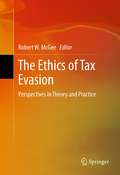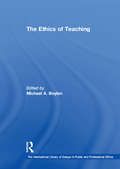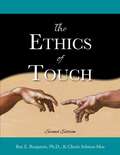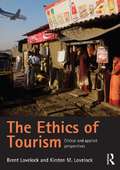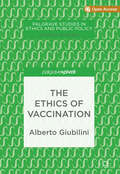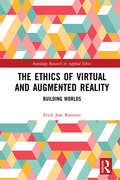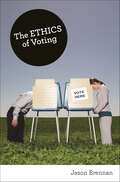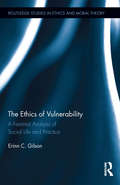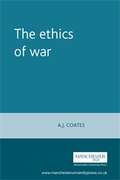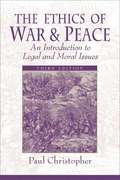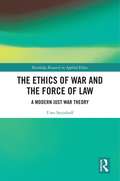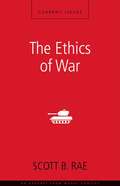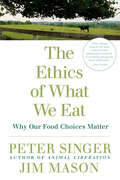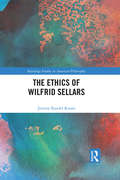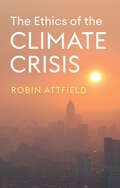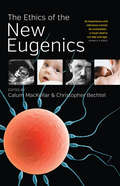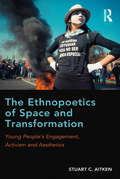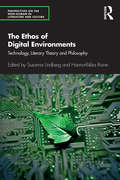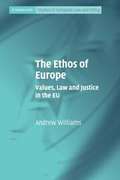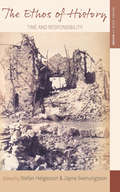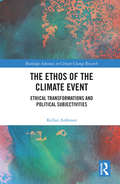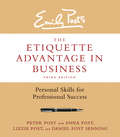- Table View
- List View
The Ethics of Tax Evasion
by Robert W. McgeeWhy do people evade paying taxes? This is the central question addressed in this volume by Robert McGee and a multidisciplinary group of contributors from around the world. Applying insights from economics, public finance, political science, law, philosophy, theology and sociology, the authors consider the complex motivations for not paying taxes and the conditions under which this behavior might be rationalized. Applying theoretical approaches as well as empirical research, The Ethics of Tax Evasion considers three general arguments for tax evasion: (1) in cases where the government is corrupt or engaged in human rights abuses; (2) where citizens claim inability to pay, unfairness in the tax system, paying for things that do not benefit the taxpayer, excessively high tax rates, or where taxes are used to support an unpopular war; and (3) through philosophical, moral, or religious opposition. The authors further explore these issues by asking whether attitudes toward tax evasion differ by country or other demographic variables such as gender, age, ethnicity, income level, marital status, education or religion. The result is a multi-faceted analysis of tax evasion in cultural and institutional context, and, more generally, a study in ethical dilemmas and rational decision making.
The Ethics of Teaching (The International Library of Essays in Public and Professional Ethics)
by Michael A. BoylanEducation is at a crossroads. While bureaucrats and teachers fight over the best way to structure and deliver education to students, much of the friction generated relates to the different conceptions of what education is about in the first place. The crisis in education is therefore of key importance and demands careful attention in order to formulate the best possible response. But before policies can be formulated, there needs to be a clear agreement on what education should be about. To this end, this collection of previously published essays facilitates just such discussion. The anthology is designed to give a snapshot of the seminal work in the philosophy of education and the input of ethical issues upon that work. It provides an authoritative tour of the profession and pivotal issues that confront it, written from a variety of international and critical perspectives.
The Ethics of Touch: The Hands-on Practitioner's Guide to Creating a Professional Safe and Enduring Practice (Second Edition)
by Cherie Sohnen-Moe Ben E. BenjaminThe authors directly address the difficult, confusing, and seldom-discussed-but-often-troubling dilemmas confronting touch therapy practitioners and help in expanding their knowledge about the field of ethics.
The Ethics of Tourism: Critical and Applied Perspectives
by Brent Lovelock Kirsten LovelockThere are increasingly strident calls from many sectors of society for the tourism industry, the world's largest industry, to adopt a more ethical approach to the way it does business. In particular there has been an emphasis placed on the need for a more ethical approach to the way the tourism industry interacts with consumers, the environment, with indigenous peoples, those in poverty, and those in destinations suffering human rights abuses. This book introduces students to the important topic of tourism ethics and illustrates how ethical principles and theory can be applied to address contemporary tourism industry issues. A critical role of the book is to highlight the ethical challenges in the tourism industry and to situate tourism ethics within wider contemporary discussions of ethics in general. Integrating theory and practice the book analyses a broad range of topical and relevant tourism ethical issues from the urgent 'big-picture' problems facing the industry as a whole (e.g. air travel and global warming) to more micro-scale everyday issues that may face individual tourism operators, or indeed, individual tourists. The book applies relevant ethical frameworks to each issue, addressing a range of ethical approaches to provide the reader with a firm grounding of applied ethics, from first principles. International case studies with reflective questions at the end are integrated throughout to provide readers with valuable insight into real world ethical dilemmas, encouraging critical analysis of tourism ethical issues as well as ethically determined decisions. Discussion questions and annotated further reading are included to aid further understanding. The Ethics of Tourism: Critical and Applied Perspectives is essential reading for all Tourism students globally.
The Ethics of Vaccination (Palgrave Studies in Ethics and Public Policy)
by Alberto GiubiliniThis open access book discusses individual, collective, and institutional responsibilities with regard to vaccination from the perspective of philosophy and public health ethics. It addresses the issue of what it means for a collective to be morally responsible for the realisation of herd immunity and what the implications of collective responsibility are for individual and institutional responsibilities.The first chapter introduces some key concepts in the vaccination debate, such as ‘herd immunity’, ‘public goods’, and ‘vaccine refusal’; and explains why failure to vaccinate raises certain ethical issues. The second chapter analyses, from a philosophical perspective, the relationship between individual, collective, and institutional responsibilities with regard to the realisation of herd immunity. The third chapter is about the principle of least restrictive alternative in public health ethics and its implications for vaccination policies. Finally, the fourth chapter presents an ethical argument for unqualified compulsory vaccination, i.e. for compulsory vaccination that does not allow for any conscientious objection. The book will appeal to philosophers interested in public health ethics and the general public interested in the philosophical underpinning of different arguments about our moral obligations with regard to vaccination.
The Ethics of Virtual and Augmented Reality: Building Worlds (Routledge Research in Applied Ethics)
by Erick Jose RamirezThis book offers new ways of thinking about and assessing the impact of virtual reality on its users. It argues that we must go beyond traditional psychological concepts of VR "presence" to better understand the many varieties of virtual experiences. The author provides compelling evidence that VR simulations are capable of producing "virtually real" experiences in people. He also provides a framework for understanding when and how simulations induce virtually real experiences. From these insights, the book shows that virtually real experiences are responsible for several unaddressed ethical issues in VR research and design. Experimental philosophers, moral psychologists, and institutional review boards must become sensitive to the ethical issues involved between designing "realistic" virtual dilemmas, for good data collection, and avoiding virtually real trauma. Ethicists and game designers must do more to ensure that their simulations don’t inculcate harmful character traits. Virtually real experiences, the author claims, can make virtual relationships meaningful, productive, and conducive to welfare but they can also be used to systematically mislead and manipulate users about the nature of their experiences. The Ethics of Virtual and Augmented Reality will appeal to philosophers working in applied ethics, philosophy of technology, and aesthetics, as well as researchers and students interested in game studies and game design.
The Ethics of Voting
by Jason BrennanNothing is more integral to democracy than voting. Most people believe that every citizen has the civic duty or moral obligation to vote, that any sincere vote is morally acceptable, and that buying, selling, or trading votes is inherently wrong. In this provocative book, Jason Brennan challenges our fundamental assumptions about voting, revealing why it is not a duty for most citizens--in fact, he argues, many people owe it to the rest of us not to vote. Bad choices at the polls can result in unjust laws, needless wars, and calamitous economic policies. Brennan shows why voters have duties to make informed decisions in the voting booth, to base their decisions on sound evidence for what will create the best possible policies, and to promote the common good rather than their own self-interest. They must vote well--or not vote at all. Brennan explains why voting is not necessarily the best way for citizens to exercise their civic duty, and why some citizens need to stay away from the polls to protect the democratic process from their uninformed, irrational, or immoral votes. In a democracy, every citizen has the right to vote. This book reveals why sometimes it's best if they don't. In a new afterword, "How to Vote Well," Brennan provides a practical guidebook for making well-informed, well-reasoned choices at the polls.
The Ethics of Vulnerability: A Feminist Analysis of Social Life and Practice (Routledge Studies in Ethics and Moral Theory)
by Erinn GilsonAs concerns about violence, war, terrorism, sexuality, and embodiment have garnered attention in philosophy, the concept of vulnerability has become a shared reference point in these discussions. As a fundamental part of the human condition, vulnerability has significant ethical import: how one responds to vulnerability matters, whom one conceives as vulnerable and which criteria are used to make such demarcations matters, how one deals with one’s own vulnerability matters, and how one understands the meaning of vulnerability matters. Yet, the meaning of vulnerability is commonly taken for granted and it is assumed that vulnerability is almost exclusively negative, equated with weakness, dependency, powerlessness, deficiency, and passivity. This reductively negative view leads to problematic implications, imperiling ethical responsiveness to vulnerability, and so prevents the concept from possessing the normative value many theorists wish it to have. When vulnerability is regarded as weakness and, concomitantly, invulnerability is prized, attentiveness to one’s own vulnerability and ethical response to vulnerable others remain out of reach goals. Thus, this book critiques the ideal of invulnerability, analyzes the problems that arise from a negative view of vulnerability, and articulates in its stead a non-dualistic concept of vulnerability that can remedy these problems.
The Ethics of War
by A. J. CoatesDrawing on examples from the history of warfare from the crusades to the present day, "The ethics of war" explores the limits and possibilities of the moral regulation of war. While resisting the commonly held view that 'war is hell', A. J. Coates focuses on the tensions which exist between war and morality. The argument is conducted from a just war standpoint, though the moral ambiguity and mixed record of that tradition is acknowledge and the dangers which an exaggerated view of the justice or moral worth of war poses are underlined.
The Ethics of War and Nuclear Deterrence
by James P. SterbaA selection of addresses, essays and lectures on the moral and ethical aspects of war and the strategy of deterrence.
The Ethics of War and Peace: An Introduction to Legal and Moral Issues
by Paul ChristopherThe most important decision that nations make is whether to use force for political objectives. In a democracy, all responsible citizens feel the weight of such decisions.
The Ethics of War and the Force of Law: A Modern Just War Theory (Routledge Research in Applied Ethics)
by Uwe SteinhoffThis book provides a thorough critical overview of the current debate on the ethics of war, as well as a modern just war theory that can give practical action-guidance by recognizing and explaining the moral force of widely accepted law. Traditionalist, Walzerian, and "revisionist" approaches have dominated contemporary debates about the classical jus ad bellum and jus in bello requirements in just war theory. In this book, Uwe Steinhoff corrects widely spread misinterpretations of these competing views and spells out the implications for the ethics of war. His approach is unique in that it complements the usual analysis in terms of self-defense with an emphasis on the importance of other justifications that are often lumped together under the heading of "lesser evil." It also draws on criminal law and legal scholarship, which has been largely ignored by just war theorists. Ultimately, Steinhoff rejects arguments in favor of "moral fundamentalism"— the view that the laws and customs of war must simply follow an immutable morality. In contrast, he argues that widely accepted laws and conventions of war are partly constitutive of the moral rules that apply in a conflict. The Ethics of War and the Force of Law will be of interest to scholars and advanced students working in just war theory, applied ethics, political philosophy, political theory, philosophy of law, and criminal and military law.
The Ethics of War: A Zondervan Digital Short
by Scott RaeDerived from Scott B. Rae’s widely adopted textbook, Moral Choices, this digital short looks carefully at war in the Bible and at major Christian views on war, including pacifism, nonviolence and nonparticipation, and Just War theory. Not afraid to tackle hot-button issues like nuclear weapons and waterboarding, Rae also includes cases and questions for further discussion. The Ethics of Business thus provides a wise and well-grounded introduction to a key ethical question for Christians, namely, “Can I support or participate in war?”
The Ethics of What We Eat: Why Our Food Choices Matter
by Peter Singer Jim MasonPeter Singer, the groundbreaking ethicist whom The New Yorker calls the most influential philosopher alive teams up again with Jim Mason, his coauthor on the acclaimed Animal Factories, to set their critical sights on the food we buy and eat: where it comes from, how it is produced, and whether it was raised humanely. The Ethics of What We Eat explores the impact our food choices have on humans, animals, and the environment. Recognizing that not all of us will become vegetarians, Singer and Mason offer ways to make healthful, humane food choices. As they point out: You can be ethical without being fanatical.
The Ethics of Wilfrid Sellars (Routledge Studies in American Philosophy)
by Jeremy Randel KoonsWilfrid Sellars’s ethical theory was rich and deeply innovative. On Sellars’s view, moral judgments express a special kind of shared intention. Thus, we should see Sellars as an early advocate of an expressivism of plans and intentions, and an early theorist of collective intentionality. He supplemented this theory with a sophisticated logic of intentions, a robust theory of the categorical validity of normative expressions, a subtle way of reconciling the cognitive and motivating aspects of moral judgment, and much more—all within a strict nominalism that preserves Sellars’s commitment to naturalism. The Ethics of Wilfrid Sellars offers the first systematic treatment of this sadly-neglected aspect of Sellars’s work, and demonstrates that his ethical theory—just like his more widely-discussed epistemology—has much to contribute to current debates.
The Ethics of the Climate Crisis
by Robin AttfieldThe planet is in crisis. Time is short, but it is still possible to mitigate greenhouse gas emissions before disaster overtakes us all. Renowned philosopher Robin Attfield explains the moral reasons for urgent action based on current harms, threats to future generations, and to the species with which we share the planet. In compelling and student-friendly prose, he explores the science of climate change, biodiversity loss and air pollution, climate injustices, political implications of the crisis, and possible responses. Among other things, he argues that measures to introduce climate justice should be paid for by countries able to pay, and by the big polluters in particular. The recently agreed Loss and Damage fund can play a central part in climate funding. Related political measures, such as the introduction of Ecocide as an international crime alongside war crimes, also give cause for hope. Attfield’s passionately argued twentieth book, The Ethics of the Climate Crisis, is crucial reading for our times.
The Ethics of the New Eugenics
by Calum Mackellar Christopher BechtelStrategies or decisions aimed at affecting, in a manner considered to be positive, the genetic heritage of a child in the context of human reproduction are increasingly being accepted in contemporary society. As a result, unnerving similarities between earlier selection ideology so central to the discredited eugenic regimes of the 20th century and those now on offer suggest that a new era of eugenics has dawned. The time is ripe, therefore, for considering and evaluating from an ethical perspective both current and future selection practices. This inter-disciplinary volume blends research from embryology, genetics, philosophy, sociology, psychology, and history. In so doing, it constructs a thorough picture of the procedures emerging from today's reproductive developments, including a rigorous ethical argumentation concerning the possible advantages and risks related to the new eugenics.
The Ethnopoetics of Space and Transformation: Young People’s Engagement, Activism and Aesthetics
by Stuart C. AitkenChange is inevitable, we are told. A job is lost, a couple falls in love, children leave home, an addict joins Narcotics Anonymous, two nations go to war, a family member's health deteriorates, a baby is born, a universal health care bill is voted into law. Life comprises events over which we have considerable, partial, or little or no control. The distance between the event and our daily lives suggests a quirky spatial politics. Our lives move forward depending upon how events play out in concert with our reactions to them. Drawing on nearly three decades of geographic projects that involve ethnographies and interviews with, and stories about, young people in North and South American, Europe and Asia and using the innovative technique of ethnopoetry, Aitken examines key life-changing events to look at the interconnections between space, politics, change and emotions. Analysing the intricate spatial complexities of these events, he explores the emotions that undergird the ways change takes place, and the perplexing spatial politics that almost always accompany transformations. Aitken positions young people as effective agents of change without romanticizing their political involvement as fantasy and unrealistic dreaming. Going further, he suggests that it is the emotional palpability of youth engagement and activism that makes it so potent and productive. Pulling on the spatial theories of de Certeau, Deleuze, Massey, Agamben, Rancière, Zizek and Grosz amongst others, Aitken argues that spaces are transformative to the degree that they open the political and he highlights the complexly interwoven political, economic, social and cultural practices that simultaneously embed and embolden people in places. If we think of spaces as events and events encourage change, then spaces and people become other through complex relations. Taking poetry to be an emotive construction of language, Aitken re-visualizes, contorts and arranges people's words and gestures to
The Ethos of Digital Environments: Technology, Literary Theory and Philosophy (Perspectives on the Non-Human in Literature and Culture)
by Susanna LindbergWhile self-driving cars and autonomous weapon systems have received a great deal of attention in media and research, the general requirements of ethical life in today’s digitalizing reality have not been made sufficiently visible and evaluable. This collection of articles from both distinguished and emerging authors working at the intersections of philosophy, literary theory, media, and technology does not intend to fix new moral rules. Instead, the volume explores the ethos of digital environments, asking how we can orient ourselves in them and inviting us to renewed moral reflection in the face of dilemmas they entail. The authors show how contemporary digital technologies model our perception, narration as well as our conceptions of truth, and investigate the ethical, moral, and juridical consequences of making public and societal infrastructures computational. They argue that we must make the structures of the digital environments visible and learn to care for them.
The Ethos of Europe
by Andrew WilliamsCan the EU become a 'just' institution? Andrew Williams considers this highly charged political and moral question by examining the role of five salient values said to be influential in the governance and law of the Union: peace, the rule of law, respect for human rights, democracy, and liberty. He assesses each of these as elements of an apparent 'institutional ethos' and philosophy of EU law and finds that justice as a governing ideal has failed to be taken seriously in the EU. To remedy this condition, he proposes a new set of principles upon which justice might be brought more to the fore in the Union's governance. By focusing on the realisation of human rights as a core institutional value, Williams argues that the EU can better define its moral limits so as to evolve as a more just project.
The Ethos of History: Time and Responsibility (Making Sense of History #34)
by Jayne Svenungsson Stefan HelgessonAt a time when rapidly evolving technologies, political turmoil, and the tensions inherent in multiculturalism and globalization are reshaping historical consciousness, what is the proper role for historians and their work? By way of an answer, the contributors to this volume offer up an illuminating collective meditation on the idea of ethos and its relevance for historical practice. These intellectually adventurous essays demonstrate how ethos—a term evoking a society’s “fundamental character” as well as an ethical appeal to knowledge and commitment—can serve as a conceptual lodestar for history today, not only as a narrative, but as a form of consciousness and an ethical-political orientation.
The Ethos of History: Time and Responsibility (Making Sense of History #34)
by Stefan Helgesson and Jayne SvenungssonAt a time when rapidly evolving technologies, political turmoil, and the tensions inherent in multiculturalism and globalization are reshaping historical consciousness, what is the proper role for historians and their work? By way of an answer, the contributors to this volume offer up an illuminating collective meditation on the idea of ethos and its relevance for historical practice. These intellectually adventurous essays demonstrate how ethos—a term evoking a society’s “fundamental character” as well as an ethical appeal to knowledge and commitment—can serve as a conceptual lodestar for history today, not only as a narrative, but as a form of consciousness and an ethical-political orientation.
The Ethos of the Climate Event: Ethical Transformations and Political Subjectivities (Routledge Advances in Climate Change Research)
by Kellan AnfinsonThis book develops a politico-ethical response to climate change that accounts for the novelty and uncertainty that it entails. This volume explores the ethical dimensions of climate change and posits that one must view it as a social construction intimately tied to political issues in order to understand and overcome this environmental challenge. To show how this ethos builds upon the need for new forms of responsiveness, Anfinson analyzes it in terms of four features: commitment, worldly sensitivity, political disposition, and practice. Each of these features is developed by putting four thinkers – Kierkegaard, Nietzsche, Schmitt, and Foucault respectively – in conversation with the literature on climate change. In doing so, this book shows how social habits and norms can be transformed through subjective thought and behavior in the context of a global environmental crisis. Presenting a multidisciplinary engagement with the politics, philosophy, and science of climate change, this book will be of great interest to students and scholars of climate change, environmental politics, environmental philosophy and environmental humanities.
The Etiquette Advantage in Business, Third Edition
by Peter Post Anna Post Lizzie Post Daniel Post SenningYour key to professional and personal successCompletely revised and updated, the third edition of the Posts' The Etiquette Advantage in Business is the ultimate guide professionals need to build successful business relationships with confidenceToday, more than ever, good manners mean good business. The Etiquette Advantage in Business offers proven, essential advice, from resolving conflicts with ease and grace to building productive relationships with colleagues at all levels. It also offers up-to-date guidance on important professional skills, including ethics, harassment in the workplace, privacy, networking, email, social media dos and don'ts, and knowing how and when to take responsibility for mistakes.For the first time in business history, four distinct generations inhabit the workplace at the same time, leading to generational differences that can cause significant tensions and relationship problems. The Etiquette Advantage in Business aims to help navigate conflict by applying consideration, respect, and honesty to guide you safely through even the most difficult situations.Written for professionals from diverse backgrounds and fields, The Etiquette Advantage in Business remains the definitive resource for timeless advice on business entertaining and dining etiquette, written communications, appropriate attire for any business occasion, conventions and trade shows, job searches and interviews, gift-giving, overseas travel, and more.In today's hyper-competitive workplace, knowing how to get along can make the difference between getting ahead and getting left behind. The Etiquette Advantage in Business provides critical tools for building solid, productive relationships and will help you meet the challenges of the work world with confidence and poise.
The Eucharist in Medieval Canon Law
by Thomas M. IzbickiThomas Izbicki presents a new examination of the relationship between the adoration of the sacrament and canon law from the twelfth to fifteenth centuries. The medieval Church believed Christ's glorified body was present in the Eucharist, the most central of the seven sacraments, and the Real Presence became explained as transubstantiation by university-trained theologians. Expressions of this belief included the drama of the elevated host and chalice, as well as processions with a host in an elaborate monstrance on the Feast of Corpus Christi. These affirmations of doctrine were governed by canon law, promulgated by popes and councils; and liturgical regulations were enforced by popes, bishops, archdeacons and inquisitors. Drawing on canon law collections and commentaries, synodal enactments, legal manuals and books about ecclesiastical offices, Izbicki presents the first systematic analysis of the Church's teaching about the regulation of the practice of the Eucharist.
